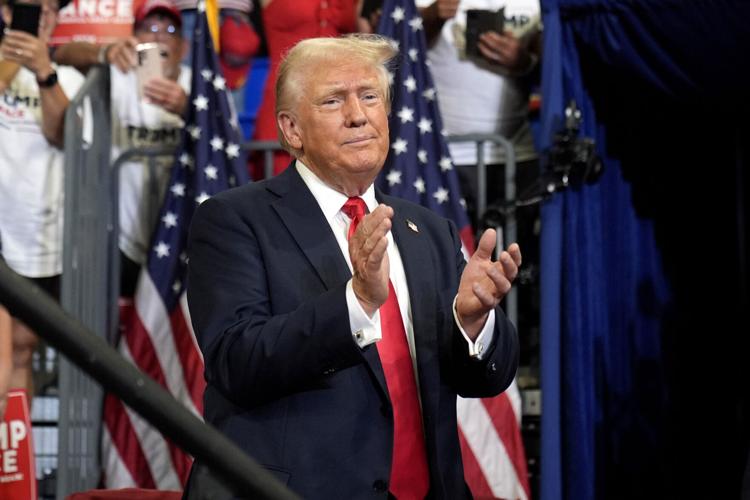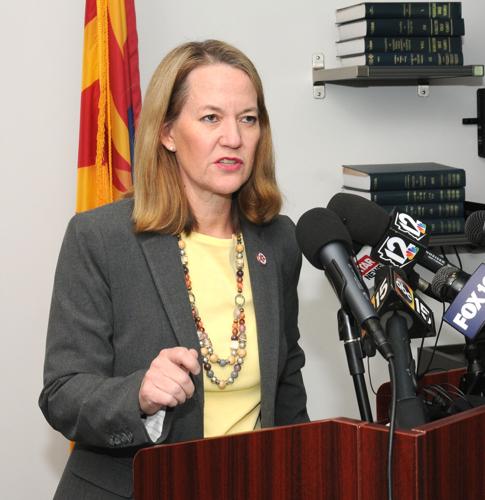PHOENIX — Arizona Attorney General Kris Mayes says that her staffers asked the state grand jury not to indict Donald Trump as part of the fake elector scheme.
The disclosure in newly released documents comes as Mayes seeks to convince Maricopa County Superior Court Judge Bruce Cohen to reject a bid by several of the defendants in the case to dismiss the various charges against them. In various motions, they contend that they are being prosecuted by Mayes for expressing their political views.
They specifically cite the state’s Strategic Lawsuit Against Public Participation law.
It is designed to prevent public officials from using the courts to punish and prevent speech on political issues. And that, the lawyers argue, is exactly what this case is all about.
But Assistant Attorney General Nicholas Klingerman, in legal papers filed for Mayes, said the record proves that if she actually were out to make political points, there were other ways for her to do that. And Exhibit No. 1 is what did — and did not — happen before the indictments were handed up.
“The state grand jury was told by the Attorney General’s Office on multiple occasions that it had the discretion to indict no one,’’ Klingerman said, that the decisions was theirs.
The other side of the equation is the former president.
“Far from being politically biased, the Attorney General’s Office, despite the grand jury’s interest in doing so, asked the grand jury to consider not indicting Donald Trump,’’ he told Cohen. Instead, the indictment names the former president as an “unindicted co-conspirator.’’
And it wasn’t just Trump who escaped criminal charges.
Klingerman said that 30 Republican members and members-elect of the House and Senate had signed a document purporting to be a joint resolution of the Legislature even though the Legislature was not actually in session at that point. They then mailed the document to Congress as legitimate and encouraged Vice President Pence to accept what Klingerman called the “forged electoral college certificates’’ that said Trump and not Biden had won the popular vote in Arizona in 2020 and was entitled to the state’s 11 electoral votes.
All this, said Klingerman, counteracts the bid by the defendants who, citing the anti-SLAPP law, say the indictment should be dismissed.
The grand jury earlier this year indicted the 11 fake electors along with seven others associated with Trump or his 2020 campaign on charges ranging from conspiracy to fraud and forgery. It all has to do with what Mayes said was their effort to undermine the results of the presidential race through a scheme to have Congress reject Democratic electors from Arizona and other key states, either to have Trump declared the winner or, at the very least, leave Biden without 270 electoral votes which would have thrown the issue to federal lawmakers.
The scheme failed, according to the indictment, because various state officials, including Gov. Doug Ducey and House Speaker Rusty Bowers, refused to cooperate. And, ultimately, it was the decision by Pence on Jan. 6, 2021 to accept the official results that boosted Biden into the White House. One of the fake electors, Loraine Pellegrino, secretary of the electors group and a past president of Ahwatukee Republican Women, agreed to plead guilty earlier this week to a single count of filing a false instrument. She was placed on unsupervised probation.
Several of the defendants now want Cohen to rule that the whole indictment should be thrown out.
The reasons differ.
For example, there’s the filing by the attorney for former state GOP Chair Kelli Ward and her husband, Michael, both of whom signed that document declaring they are the electors. Their lawyer points out that Mayes, even before taking office, criticized predecessor Mark Brnovich for not investigating.
“There is no mystery about what happened here,’’ Mayes posted on social media. “The fake electors videotapes their crime for all to see.’’
Beyond that, the pair say what they did fell within the protections of the First Amendment. Similar arguments are made by other defendants.
Klingerman, in his own filing, says those arguments fall short.
Consider, he said, any claim of political retaliation.
“The attorney general can campaign on prosecuting crime, including election crimes,’’ Klingerman said.
“She can prosecute members of a different political party,’’ he continued. “And she can make political statements all without any desire to deter, retaliate against or prevent the lawful exercise of the defendants’, or anyone’s, constitutional rights.’’
All that relates to what Klingerman said was the restraint urged by the Attorney General’s Office to grand jurors not to go beyond the 18 indictments they did approve. And that starts with Trump.
Some of that, he conceded, was practical.
Klingerman said grand jurors were given a presentation about the policies at the U.S. Department of Justice, specifically about issues of duplication of federal and state actions.
By that time, Trump already had been indicted by a federal grand jury on charges he conspired to defraud the country in attempting to prevent the peaceful transfer of presidential power. The documents filed by Mayes’ office cite an unnamed prosecutor’s conversations with the grand jurors.
“I don’t know if I have all the evidence to prosecute it at this moment,’’ that person is quoted as saying, adding that the grand jurors should “weigh this policy heavily.’’
“That is why I have not recommended that in the draft indictment, despite clear indications from you all that there’s an interest in pursing a charge against him,’’ the prosecutor is quoted as saying of Trump. “I know that may be disappointing to some of you. I understand.’’
As it turns out, though, those federal charges may have since been undermined by a U.S. Supreme Court ruling in June that says Trump enjoys certain immunity for acts committed while he was president, which covers everything up to Jan. 20, 2021.
Klingerman said, though, this evidence works against any claims by those challenging the indictment that the grand jury’s decision was somehow controlled, interfered with or determined by the Attorney General’s Office.
Closely related is that allegation under SLAPP by some of the defendants they are being pursued for exercising their free speech rights.
“There is no question that defendants were entitled to express their support for former President Trump and to even make false statements concerning the 2020 election, as a general matter,’’ Klingerman said.
“But this case is not about those types of speech, despite defendants’ attempts to muddy the waters.’’
Consider, he said, the argument that submission of an “alternate’’ slate of electors constitutes a lawful exercise of the right to petition the government for redress.
What’s lost in all that, said Klingerman, is that the grand jury found that the defendants “knowingly and intentionally conspired to create, prepared, and submitted a presidential electors slate that misrepresented that they were the ‘duly elected and qualified’ presidential electors for the state of Arizona.’’
On top of that, he said, they misrepresented to the public that the slate was prepared solely as a “contingency’’ in the event a legal challenge to the election succeeded.
Finally, Klingerman said, the indictment says the conspirators “engaged in a campaign at nearly every level of local, state and federal government to have the fake slate accepted over the genuine one,’’ even though none of the legal challenges to the 2020 presidential race were successful.
“Indeed, the indictment even outlines evidence that the legal challenges filed by defendants were a mere pretext to conceal defendants’ efforts to overturn the election by any means necessary,’’ he said.
Klingerman warned that accepting what the defendants are accused of doing as a legitimate exercise of their First Amendment rights would turn criminal law on its head.
For example, he said crimes such as homicide, drug possession and sex offenses could be claimed to “involve’’ religious freedom.
Then there’s the possibility that defendants could claim their freedom of association is being impaired if they are charged with everything from gang offenses and hazing to family related crimes. And it could be considered interfering with freedom of speech to charge someone with threatening, fraud, bribery, residential picketing and obscenity.
“Simply asserting some crime has a relationship to a constitutional right does not mean prosecuting its commission interferes with those rights,’’ he said.
Then there’s that purported — and clearly false — “joint legislative resolution’’ to Congress about the 2020 race.
Klingerman said grand jurors had listed all 30 signers — all current or members-elect — as targets of the probe. But he said attorneys from his office sought to dissuade the panel members from indicting them.
“The state explained the political process and told the grand jury, ‘I would be very cautious finding an intent to fraud with all 30 members that signed that,’ ‘’ Klingerman said, even urging the panel to “give them the benefit of the doubt at this point.’’
Two of the signers of the “resolution’’ actually were indicted: state senators Anthony Kern and Jake Hoffman. But their charges relate to the fact they were among the 11 fake electors.
Other than the fake electors, the indictment includes former White House chief of staff Mark Meadows and attorneys John Eastman and Christina Bobb. Another Trump attorney, Jenna Ellis, is having the charges against her dismissed after she agreed to cooperate with prosecutors in Arizona.





